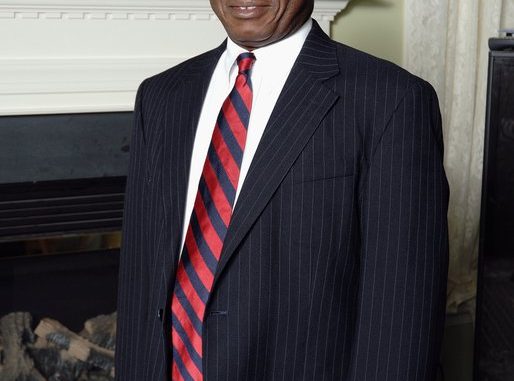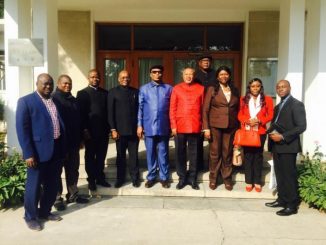
By Dr. Yahya Kaloko :
History as consumed by the enlightened is about the past, present, and the future. Among these three attributes, the one that has always proved to be the greatest human challenge is the future. The future has a tendency to be elusive and uncertain. What makes it more difficult and challenging is the tendency for some to use it as a pretext to prove righteous in their actions. We live in a world today where socio-cultural, religious and economic interests serve as recipes for others, especially those with the might to dispossess weaker counterparts. Wars have been waged and fought for control of territory, for moral equivalence, and in large part for global dominance. A nation that is militarily weak has to think twice even to fight for its national interests against one that is militarily superior. In the event where both possess military might that could be relatively matched evenly against each other, the probability of a war is very minimal. One can never envisage a war between superpowers or nuclear nations. No matter how high the tensions elevate, there are always back door deals to prevent war between those nations because of the perceived catastrophic outcomes. This is the main reason why Russia in her current actions against Ukraine cannot be attacked militarily by a “coalition of the willing” to force her to abandon territorial ambitions in the Ukraine. The doctrine of a “just war” could not be considered.
DR. YAHYA KALOKO
But it is also important to point out that Russia’s current actions are nothing new in the realm of international adventurism by stronger nations. The questions one may ask relate to the historical context of the past: How did all the most powerful nations of today came about? How were they formed? What are their current and future international objectives? The simple answer to all these questions could be gleaned within the framework of national and regional interests especially in post-cold war era. The Western Alliance, the Chinese, Russia, and some Asian nations are all doing it, and there are so many unresolved and never to be resolved territorial disputes in which the winners, supposedly stronger nations always emerge as victors. These are the nations that may also have the luxury to write the historical outcomes, because dead men tell no tales. Fundamentally, the rational is practically difficult to be applied using a dictum of universal human rights as internationally proclaimed, i.e. a foundationalist perspective,. At the same time, it must not be based on a constructivist’s view which tends to equate the norms of stable and advanced societies to less stable ones because of socio-cultural differences. The most appropriate approach must be based on a consensual foundation (ethical positivism). This approach dictates the formation of universally binding forms of behavior expressed by both formal and informal rules of domestic society. It must also encompass international political morality based on “shared norms, conventions, informal agreements, and declarations … .” (Amstutz, 2008). The unfortunate tendency is that even though this theory calls for collaborative engagements, however the relationships both domestic and international are usually determined by the degree of clout a certain group or nation has over others. For example, is Mexico and Argentina bothered by the current situation between the West and Russia when they feel their territorial rights were infringed upon by US and Britain respectively? The threat of economic sanctions without the inherent threat of military options will not stop Russia from having its way. In most cases, it is all about where the interests of the stronger nations lie, and not so much about political morality.
Another important component to the argument relates to defining legitimate uprisings. In the current tussle for influence in Ukraine certain groups within regions are rising up against regional authority and requesting separation from Ukraine. The moral dilemma in this situation is based on determining how vastly different this is from other socio-political unrests in other parts of the world. Some of them are relatively peaceful, compared to other social upheavals in the Middle East like in Egypt. Of course the dynamics could be different in terms of the national dimension; however they provide recipes for other socio-political upheavals within and without. It is very easy for such movements to enhance copycat actions by players motivated by other powerful forces. As highlighted by some thinkers, moral systems in many communities have evolved over time, and the notion of moral obligation to national or communal authority has been greatly eroded. As stated by Amstutz, “the claim that all morality is subjective and relative is not empirically sustainable.” The difficulty here is that there is no universal moral code. The dilemma in international politics as regards ethical behaviors of global states stems from the divergence between communitarianism, a conception of the international community as a society of states, and cosmopolitanism with a view of the world as one global society (Amstutz). However, according to Stanley Hoffman, there is a “cacophony of standards” because of the diversity in the plurality in international cultures and moralities. Unlike the domestic entity, the international community lacks comparable legal or political institutions. In contemporary times, the resolution of misunderstanding or conflict in many instances is carried out through the barrel of the gun or sword. The only deterrent in this regard sometimes is the relative strength between the adversaries, and in this regard, the Western Alliance which in many situations serves as the main international military force in threatening reprisal in the event of pariah tendencies by some states or state actors. But such action cannot be considered in the case of Russia in its alleged protection of its national interest needs.
Ultimately, national interest is the defining motivation of stronger nations or alliances to pivot themselves in the international arena. A more fundamental equation to consider in the current Russian action is not only interest, but strategic positioning. Simferopol in the Crimea is the home of Russia’s naval corridor to the Western Alliance. From a military strategic perspective, which international military power will allow such a situation to unfold in its backyard? Russia’s move as alleged is to protect its national interests, in addition to the historic socio-cultural, economic and political imperatives between the supposedly two sovereign nations. As highlighted by Joseph Nye, Jr. (Foreign Affairs, July/August 1999), “national interests are the fundamental building blocks in any discussion of foreign policy …” especially in the justification of the use of unilateral force. Vital strategic concerns especially for the military superior nations deserve priority over any other issues. Within this context, there are no moral imperatives for Russia, especially in the absence of the “just-war” doctrine from the international community. This does not mean Russia is right in her actions from the perspective of international norms. However, the country’s leadership feels it has a moral imperative to defend the strategic interests of its nation. Notwithstanding Western rhetoric against Russia, it is still without doubt a major player in international affairs. I believe the threat of economic sanctions against Russia will hurt Ukraine more than Russia because of the inherent socio-cultural and economic relationships. The calculation of the Russian leadership is that a few years from now all this will be mostly forgotten and international cooperation on other issues with the Western Alliance could trump the issue of Ukraine. Russia knows that and the West also understands that. Within the last decade or so, the ghosts of history had been awakened by some of the great powers, and this phenomenon will continue whenever the interests of stronger nations are threatened.





Leave a Reply